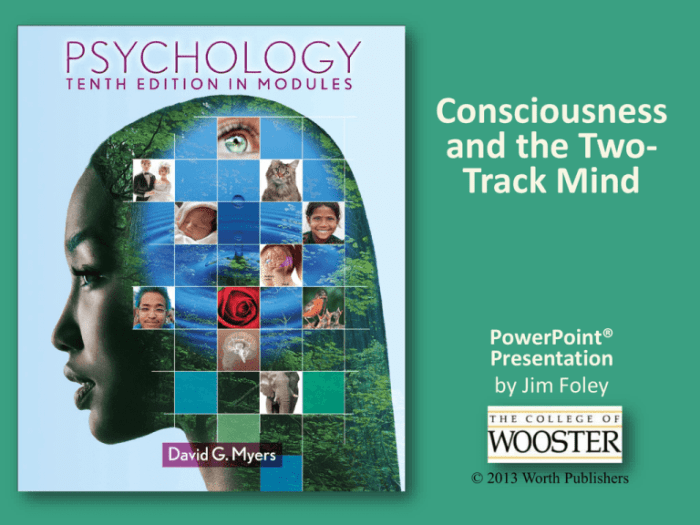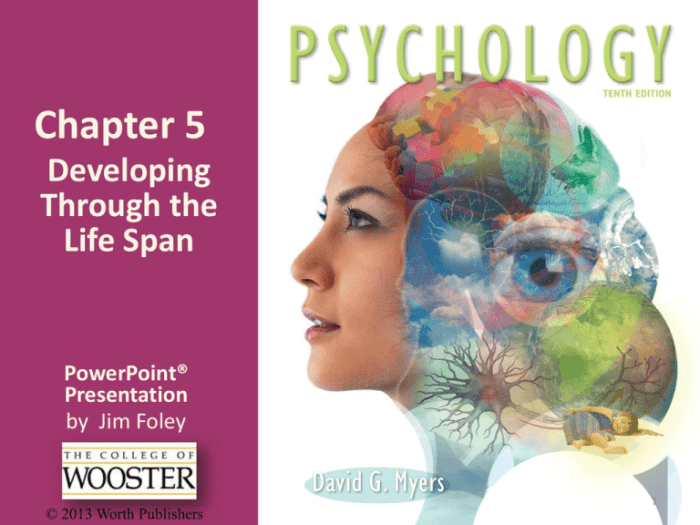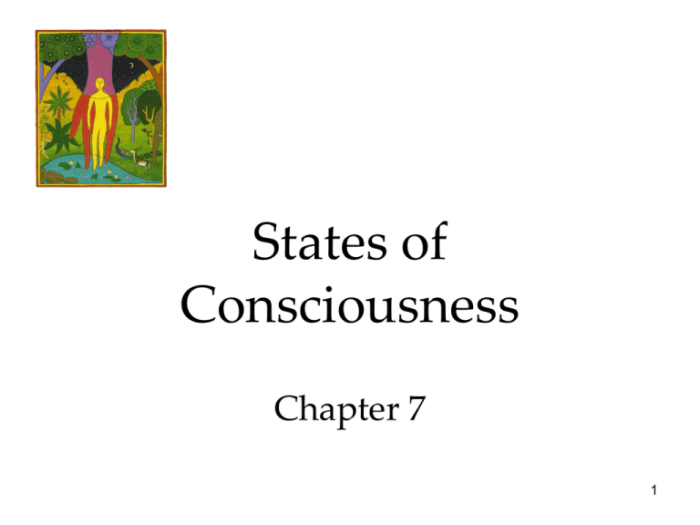Psychology 13th edition david myers – Psychology 13th Edition by David Myers embarks on a captivating journey into the intricacies of the human mind and behavior, unraveling the fundamental principles that shape our thoughts, feelings, and actions. This comprehensive and meticulously crafted edition presents a fresh perspective, delving deeper into the latest research and emerging trends in the field of psychology.
From the biological underpinnings of behavior to the profound influence of social and cultural factors, Psychology 13th Edition provides a comprehensive examination of the multifaceted nature of human psychology. Myers’ engaging writing style and insightful case studies bring psychological concepts to life, fostering a deeper understanding of the complexities of the human experience.
Introduction to Psychology 13th Edition by David Myers
Psychology: Frontiers and Applications, 13th Edition, by David Myers, is an introductory psychology textbook that presents a comprehensive overview of the field. The book is written in a clear and engaging style, and it is packed with up-to-date research and real-world examples.
The 13th edition includes a number of new features, such as a new chapter on the psychology of health and well-being, and a new section on the latest research on the brain and behavior.The main themes of the book are the scientific method, the importance of critical thinking, and the diversity of human behavior.
Myers emphasizes the importance of using the scientific method to study psychology, and he provides students with the tools they need to evaluate psychological research. He also stresses the importance of critical thinking, and he encourages students to question their own assumptions and to be open to new ideas.
Finally, Myers highlights the diversity of human behavior, and he shows how culture, gender, and other factors can influence our thoughts, feelings, and actions.
Significance of the 13th Edition
The 13th edition of Psychology: Frontiers and Applications includes a number of significant changes from previous editions. These changes include:
- A new chapter on the psychology of health and well-being.
- A new section on the latest research on the brain and behavior.
- A revised and updated chapter on personality.
- A new emphasis on the importance of critical thinking.
- A new set of pedagogical features designed to help students learn and retain information.
Core Concepts and Theories in Psychology

Psychology, as a scientific discipline, has a set of core concepts and theories that form the foundation of the field. These concepts provide a framework for understanding human behavior, mental processes, and experiences. Major theories in psychology offer explanations for a wide range of psychological phenomena.
Fundamental Concepts of Psychology
Psychology encompasses various fundamental concepts that help describe and explain psychological processes and behaviors. Some of these key concepts include:
- Perception:The process of receiving and interpreting sensory information from the environment.
- Learning:The acquisition of new knowledge, skills, and behaviors through experience.
- Motivation:The internal forces that drive behavior and goal-directed actions.
- Emotion:Complex psychological states that involve subjective feelings, physiological responses, and behavioral expressions.
Major Theories in Psychology
Psychology has a rich history of theoretical perspectives that have shaped our understanding of human psychology. Three major theoretical approaches include:
- Behaviorism:Emphasizes the role of observable behaviors and environmental factors in shaping behavior, focusing on the principles of learning and reinforcement.
- Cognitive Psychology:Explores the mental processes involved in perception, memory, attention, and problem-solving, emphasizing the role of internal cognitive structures and processes.
- Humanistic Psychology:Focuses on the subjective experiences of individuals, emphasizing personal growth, free will, and the pursuit of self-actualization.
Applications of Psychological Theories
Psychological theories have practical applications in various fields, including:
- Clinical Psychology:Applying psychological principles to diagnose and treat mental health disorders.
- Educational Psychology:Utilizing psychological insights to improve teaching and learning methods.
- Organizational Psychology:Applying psychological principles to enhance employee performance and organizational effectiveness.
Biological and Cognitive Processes
The biological and cognitive processes underlying human behavior are complex and multifaceted. The nervous system, brain, and genetics all play a crucial role in shaping our thoughts, feelings, and actions. In addition, cognitive processes such as perception, attention, memory, and language allow us to interact with our environment and make sense of the world around us.
Biological Basis of Behavior
The nervous system is a complex network of cells that transmits information throughout the body. The brain is the central organ of the nervous system and is responsible for controlling most of our bodily functions, including our thoughts, emotions, and movements.
The brain is divided into two hemispheres, the left and right hemispheres, which are connected by a thick band of nerve fibers called the corpus callosum. Each hemisphere is responsible for different functions, with the left hemisphere being dominant for language and logic, and the right hemisphere being dominant for spatial reasoning and creativity.Genetics
also plays a role in shaping our behavior. Our genes determine our physical characteristics, such as our height, weight, and hair color, as well as our susceptibility to certain diseases. Genes also influence our personality traits, such as our extroversion, introversion, and agreeableness.
Cognitive Processes
Cognitive processes are the mental processes that allow us to perceive, attend to, remember, and understand information. Perception is the process of taking in information from our environment and interpreting it. Attention is the process of focusing our mental resources on a particular stimulus or task.
Memory is the process of storing and retrieving information. Language is the system of communication that we use to express our thoughts and feelings.
Neuroscience
Neuroscience is the scientific study of the nervous system and brain. Neuroscientists use a variety of techniques, such as brain imaging, electroencephalography (EEG), and magnetoencephalography (MEG), to study the structure and function of the brain. Neuroscience has helped us to understand how the brain controls our thoughts, feelings, and actions, and has also led to the development of new treatments for neurological disorders.
Social Psychology and Cultural Influences

Social psychology examines the influence of social factors on individual behavior, while cultural psychology explores how cultural norms and values shape psychological processes.
Social Factors on Behavior
Social norms, conformity, and prejudice are potent social forces that influence behavior. Social norms are unwritten rules that guide acceptable conduct within a society. Conformity is the tendency to align one’s beliefs and actions with those of a group, even when personal convictions differ.
Prejudice, a negative attitude towards a particular group based on preconceived notions, can lead to discrimination and conflict.
Cultural Influences on Psychology
Culture profoundly impacts cognition, emotion, and self-concept. Cross-cultural research has revealed significant variations in these psychological processes across cultures. For instance, studies have shown that individuals from collectivist cultures tend to prioritize group harmony and interdependence, while those from individualistic cultures emphasize personal autonomy and self-reliance.
Implications of Cross-Cultural Research
Cross-cultural research provides valuable insights into the diversity of human behavior and challenges ethnocentrism. It has implications for understanding mental health, education, and intercultural communication. By recognizing the influence of culture on psychological processes, we can foster empathy, tolerance, and a deeper appreciation for human diversity.
Personality and Individual Differences
Personality refers to the enduring patterns of thoughts, feelings, and behaviors that characterize an individual. It encompasses the unique qualities that make each person different from others. Understanding personality is crucial for comprehending human functioning and predicting behaviors in various contexts.
Major Theories of Personality
Psychoanalytic theory, humanistic theory, and trait theory are the three primary approaches to understanding personality.
- Psychodynamic Theory:This theory emphasizes the role of unconscious processes, particularly childhood experiences, in shaping personality. It posits that personality develops through conflicts between the id, ego, and superego.
- Humanistic Theory:This theory focuses on the individual’s subjective experiences, personal growth, and self-actualization. It emphasizes the importance of free will, personal responsibility, and the potential for change.
- Trait Theory:This theory suggests that personality can be described in terms of a set of stable and enduring traits. These traits are considered to be relatively consistent across situations and time.
Individual Differences and Personality
Individual differences refer to the variations in personality traits and behaviors among individuals. These differences can be attributed to a combination of genetic, environmental, and social factors.
- Genetic Influences:Studies have shown that certain personality traits, such as extroversion and neuroticism, have a genetic basis.
- Environmental Influences:Early experiences, cultural factors, and social interactions can significantly shape personality development.
- Social Influences:The social environment, including family, friends, and peers, plays a crucial role in shaping an individual’s personality.
Assessment of Personality
Psychologists use various methods to assess personality, including:
- Self-Report Measures:Questionnaires and inventories that ask individuals to provide information about their own thoughts, feelings, and behaviors.
- Observational Methods:Techniques that involve observing an individual’s behavior in different situations.
- Projective Tests:Tests that present ambiguous stimuli and ask individuals to interpret them, revealing unconscious thoughts and feelings.
Understanding personality and individual differences is essential for comprehending human functioning and predicting behaviors in various contexts. By utilizing different assessment methods and considering the interplay of genetic, environmental, and social factors, psychologists strive to unravel the complexities of personality and its implications for human behavior.
Psychological Disorders and Treatment

Psychological disorders are mental illnesses that cause significant distress or impairment in a person’s life. They can affect a person’s thoughts, feelings, and behaviors, and can range from mild to severe.
Major Categories of Psychological Disorders
The major categories of psychological disorders include:
- Anxiety disorders: These disorders are characterized by excessive fear, worry, or anxiety. They can include conditions such as generalized anxiety disorder, panic disorder, and phobias.
- Mood disorders: These disorders affect a person’s mood, causing extreme sadness or elation. They can include conditions such as depression, bipolar disorder, and seasonal affective disorder.
- Personality disorders: These disorders are characterized by inflexible and unhealthy personality traits that cause significant distress or impairment in a person’s life. They can include conditions such as antisocial personality disorder, borderline personality disorder, and narcissistic personality disorder.
Types of Psychological Treatments
There are various types of psychological treatments available, including:
- Psychotherapy: This involves talking to a therapist about one’s thoughts, feelings, and behaviors. It can help people understand their problems, develop coping mechanisms, and change their behavior.
- Medication: This involves taking medication to treat the symptoms of a psychological disorder. Medication can be helpful in reducing symptoms and improving a person’s quality of life.
- Behavioral interventions: These interventions involve changing a person’s behavior through techniques such as exposure therapy, cognitive-behavioral therapy, and dialectical behavior therapy.
Effectiveness and Limitations of Treatment Approaches
The effectiveness of different treatment approaches varies depending on the individual and the specific disorder being treated. Psychotherapy, medication, and behavioral interventions can all be effective in treating psychological disorders.
However, there are also limitations to each approach. Psychotherapy can be time-consuming and expensive, and it may not be effective for everyone. Medication can have side effects, and it may not be appropriate for all disorders. Behavioral interventions can be challenging to implement, and they may not be effective for all people.
Applications of Psychology: Psychology 13th Edition David Myers
Psychology is a multifaceted discipline with far-reaching applications that extend beyond the confines of academia. Its principles and insights have been successfully applied in diverse fields, such as education, healthcare, and business, leading to tangible improvements in human well-being and productivity.
In the realm of education, psychology plays a pivotal role in shaping effective teaching methodologies and learning environments. Understanding cognitive processes, motivation, and developmental psychology enables educators to tailor their instruction to the specific needs and abilities of students, fostering optimal learning outcomes.
Healthcare, Psychology 13th edition david myers
Within the healthcare sector, psychology contributes significantly to the promotion of mental health, prevention of illness, and provision of effective treatments. Psychologists collaborate with medical professionals to assess and diagnose mental disorders, develop evidence-based interventions, and provide therapeutic support to individuals and families.
Business
The application of psychology in business has gained prominence in recent years, as organizations recognize the importance of understanding human behavior in the workplace. Psychologists assist businesses in areas such as employee selection, motivation, team dynamics, and consumer behavior, helping them optimize performance and achieve their strategic goals.
Ethical Considerations
As the applications of psychology expand, it is crucial to address the ethical implications associated with its use. Psychologists must adhere to strict ethical guidelines to ensure that their work is conducted with integrity, respect for human rights, and a commitment to beneficence.
This includes obtaining informed consent from participants, maintaining confidentiality, and avoiding any potential harm or exploitation.
Emerging Trends and Future Directions
The field of psychology is constantly evolving, with new research and advancements shaping its future direction. Emerging trends include the increasing use of technology in psychological interventions, the integration of neuroscience and psychology, and a growing focus on cross-cultural and global perspectives.
These developments promise to further expand the reach and impact of psychology in the years to come.
Essential Questionnaire
What are the key themes of Psychology 13th Edition by David Myers?
Psychology 13th Edition focuses on the core concepts of psychology, the major theories that have shaped the field, the biological and cognitive processes that underlie behavior, the influence of social and cultural factors, personality and individual differences, psychological disorders and treatment, and the applications of psychology in various fields.
How does the 13th edition differ from previous editions?
The 13th edition of Psychology by David Myers incorporates the latest research findings and emerging trends in the field, offering a fresh perspective and updated content throughout the text.
What is the significance of the biological basis of behavior in psychology?
Understanding the biological basis of behavior provides insights into the physiological processes that influence our thoughts, feelings, and actions, helping us to comprehend the complex interplay between mind and body.
How does culture impact psychological processes?
Culture plays a significant role in shaping our beliefs, values, and behaviors, influencing our perception, cognition, emotion, and self-concept, highlighting the importance of considering cultural factors in psychological research and practice.
What are the major categories of psychological disorders?
The major categories of psychological disorders include anxiety disorders, mood disorders, personality disorders, and psychotic disorders, each characterized by distinct symptoms and patterns of behavior.
